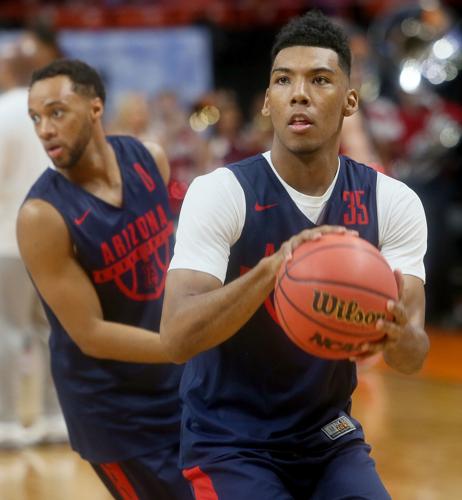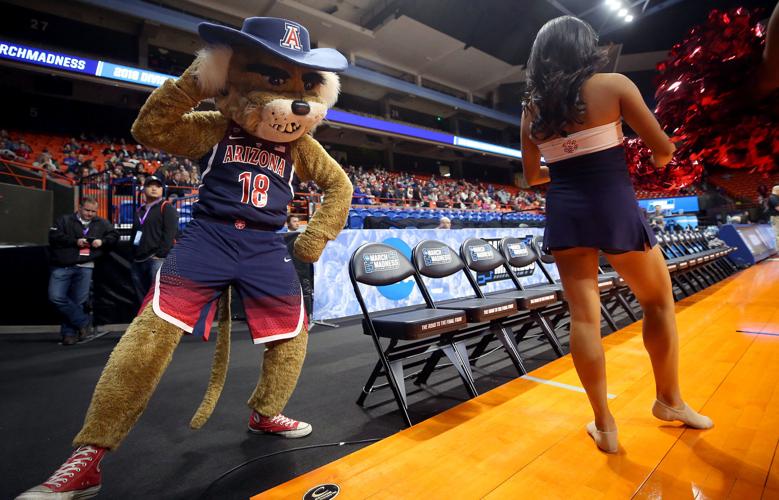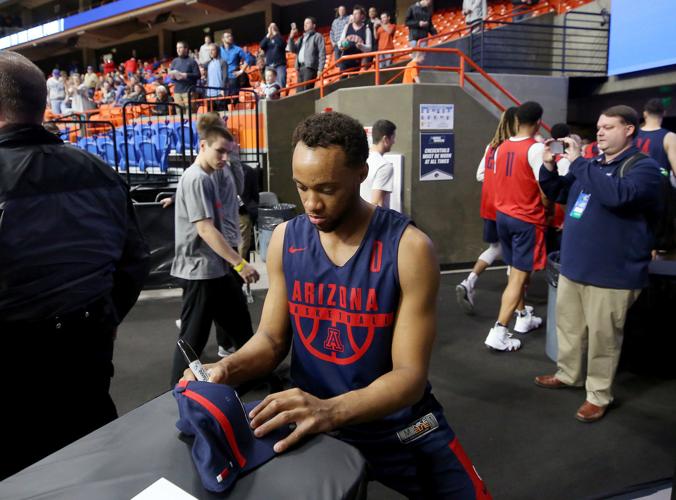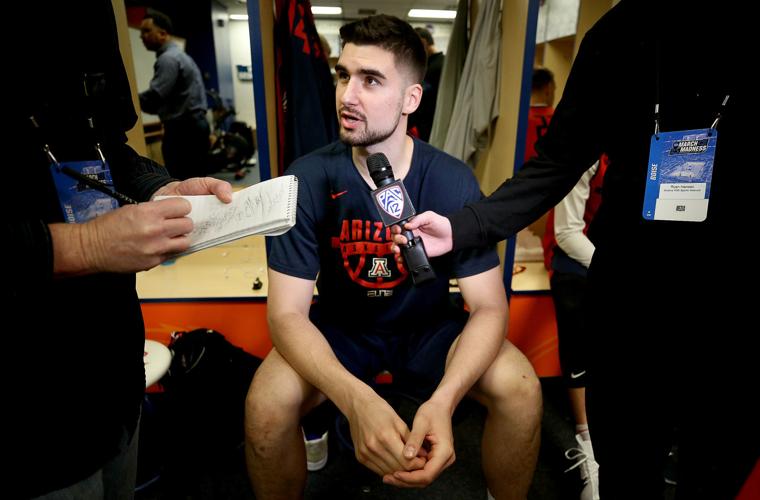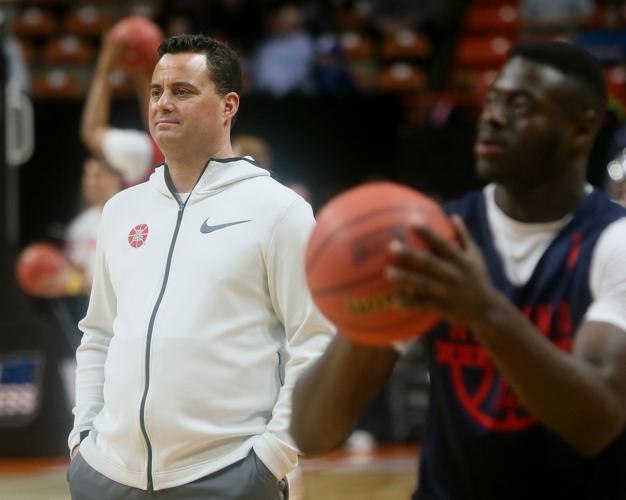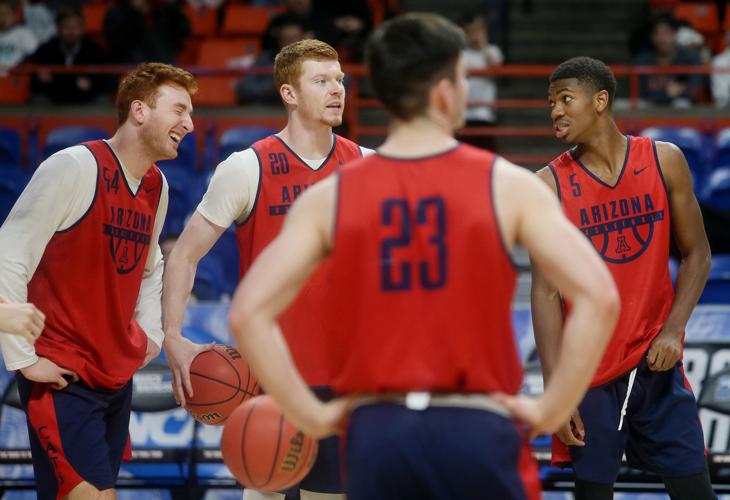BOISE, Idaho — Four inches of snowfall greeted Allonzo Trier in Salt Lake City on Feb. 23, messing up some 420 flights, and Arizona’s junior guard had every reason to believe he was heading for a cancellation, too.
Not just his return flight from Utah to Oregon, where his teammates were playing the Ducks the next day. But his season, his college career and the NCAA Tournament that he and the Wildcats will begin Thursday against Buffalo.
All of that was in danger that day, after Trier flew in from Oregon, raced with a UA compliance official to a laboratory … then urinated.
He had no choice. A random positive test for a trace amount of Ostarine, the same PED that derailed the first half of his sophomore season in 2016-17 had reappeared and resulted in a suspension starting on Feb. 22 against Oregon State.
Trier needed a clean test to help appeal his suspension the following week, to make sure he didn’t miss any more than the OSU game and the Feb. 24 Oregon game.
“It was like the whole thing happened over again,” Trier said Wednesday, between workouts while the Wildcats prepared for Buffalo. “It was annoying. Irritating. A frustrating situation. And then to come back and watch my team play and lose (at Oregon) … I would have definitely made a difference in that game.”
Because labs in Salt Lake City and Los Angeles were the only ones equipped to give an immediate result for Ostarine, Trier took a day trip that Arizona athletic director Dave Heeke said became “more than that.”
That was thanks to Mother Nature, not anything the NCAA was doing.
“The weather was really bad in Salt Lake at the time,” Trier said. “There was snow, ice, all kinds of stuff. Flight was delayed, so I didn’t come back till the next day. It was a longer trip than it should have been.”
The loss was a bummer for the Wildcats, of course. Had Trier played at Oregon, the Wildcats might have won and then received a better NCAA Tournament seed than No. 4 — and maybe even be sent to San Diego instead of Boise, Idaho, this week.
(NCAA selection committee chair Bruce Rasmussen said key absences were not factored in this year, meaning the Wildcats were not given any credit for being without Trier or Rawle Alkins for four losses this season.)
UA freshman forward Deandre Ayton said Trier could have definitely helped the Wildcats win in Eugene. But he also saw a victory even in the loss, on a surreal night when UA coach Sean Miller also was not present after an ESPN report said he discussed paying a recruit.
“Allonzo handled it really professional like always and he showed us what type of player he is,” Ayton said. “He left at a weird time. You could tell he’d been through it already. He was like ‘whatever’ at first, but he was hurt. He was hurt, and he fought through it.”
Trier didn’t get to Utah until late in the day, spending hours hydrating along the way. His attorney, Steve Thompson, argued that dehydration was a factor in the positive PED test he took on a January morning.
Then, after the lab results came back negative from the Feb. 23 test, Trier, Thompson and UA officials held an appeal via telephone with the NCAA drug testing officials and a lab director at UCLA.
It still wasn’t expected to be an easy case to win. Thompson said Trier’s positive test from January was .015 parts per billion, or about six grains of salt in 10 Olympic pools, the lowest amount that could be detected.
Several pharmaceutical experts told the Star that Ostarine generally leaves the body within a week and that it was extremely unlikely, though conceivable, that the drug would remain in someone’s body that long.
But in part because the second test was negative, Thompson said NCAA officials and the lab director ultimately concluded that the Ostarine lodged into Trier’s fatty issues.
“He’s good to go,” Thompson said after the appeal was heard March 1. “The committee looked at that (the second test) and said this was a residual amount from the prior administration in 2016.”
Two days after Trier won the appeal, his mother, Marcie, copied the Star on an impassioned group text message she sent out to thank UA staff and attorneys.
“I hope and pray that no student athlete and their family will ever have to experience the pain and suffering that my son and our family has endured,” Marcie Trier said. “This has been an incredibly frustrating situation and I thank God that the truth prevailed.”
Although Trier said he never doubted he would get back, he, too, thanked the school officials, team staffers and compliance officers for helping him get back on the court quickly.
“I’m thankful to all those people,” Trier said. “Now it’s about trying to make the most of this opportunity.
“This is what I came back to be a part of, to try to go out here and be a part of something special with this team and coach Miller.”


